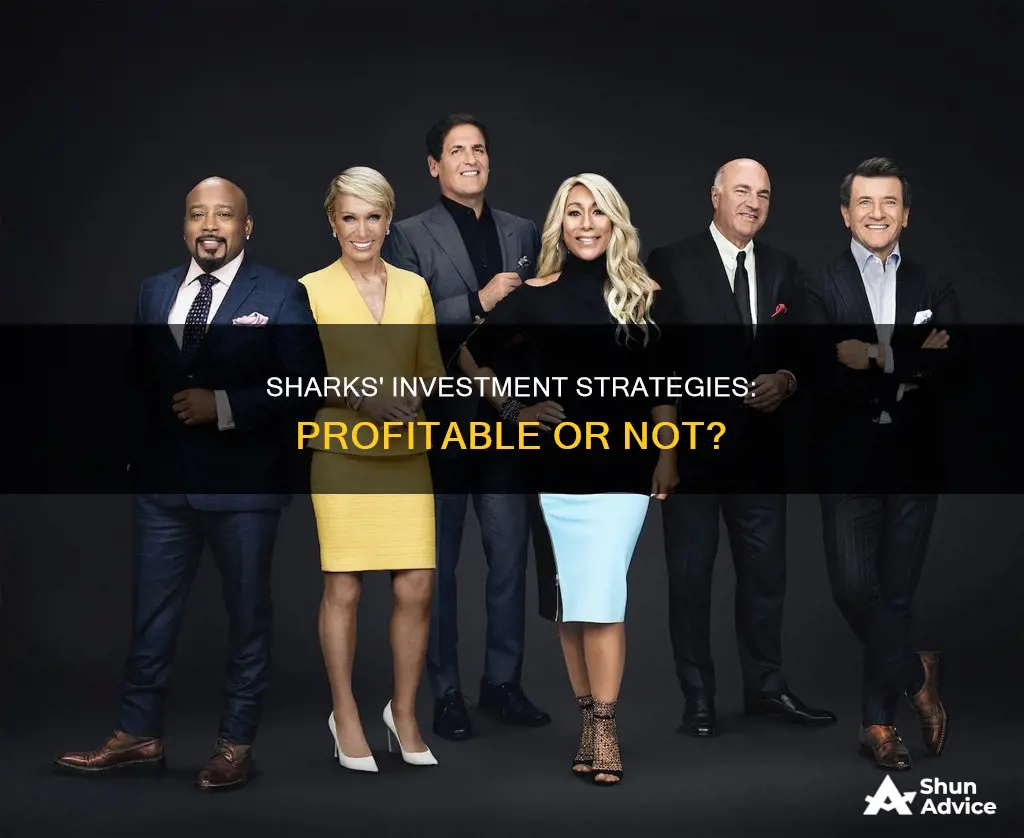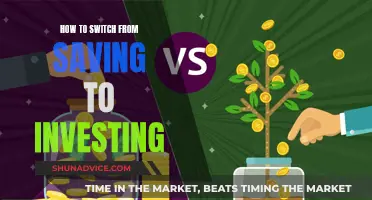
Shark Tank is a popular American TV show where aspiring entrepreneurs pitch their business ideas to a panel of investors, or sharks, in the hopes of securing funding. Over the course of the show's history, millions of dollars have been invested, and many companies have found success after appearing on the show. However, the question remains: do the sharks actually make a profit on their investments? The answer is complex and depends on a variety of factors.
| Characteristics | Values |
|---|---|
| Shark Tank investments are profitable | 10% |
| Average time for a return on investment in a startup | 5-9 years |
| Royalty deals | The shark might recoup their investment |
| Payout clause | The shark gets paid when the owner gets paid |
| Buyout from another entity | The shark makes money |
| Exit | When the company goes public or is acquired by a larger firm |
What You'll Learn
- Shark Tank investments are long-term plays, with exits taking 5-9 years on average
- Sharks may not make money from their investments but instead from the boost to their personal brands
- Royalty deals are the exception to the rule, offering sharks a liability payout
- Sharks may not get paid back if the company doesn't turn a profit
- The exposure from Shark Tank can be enough to attract other investors and propel companies to success

Shark Tank investments are long-term plays, with exits taking 5-9 years on average
Shark Tank investments are typically structured as equity deals, where the shark receives a percentage of ownership in the company in exchange for their investment. These types of investments are long-term plays and only pay out when there is an exit, such as an initial public offering (IPO) or acquisition by a larger firm. It's unlikely for a shark to turn a profit in just one year, as it takes time for the company to increase its sales and become profitable.
The average time for a return on investment in startups is 5-9 years. Sharks make money when there is an exit, such as a buyout or acquisition by another entity. Even if the company's sales increase due to the shark's help, it doesn't necessarily mean the company is profitable. The money earned needs to go towards paying off any debt before it can be paid out to the shark.
Additionally, the sharks may include clauses in their deals that ensure they get paid when the entrepreneur does. For example, they may structure the deal so that they receive a payout whenever the entrepreneur pays themselves a salary or takes a distribution from the company. This helps the sharks recoup their investment even if the company is not yet profitable.
Overall, Shark Tank investments are long-term plays that may take several years to generate a return. Sharks make money by exiting their investments through buyouts or acquisitions and may also include clauses in their deals to ensure they get paid.
Managing Investments: Quicken's Smart Strategies
You may want to see also

Sharks may not make money from their investments but instead from the boost to their personal brands
Sharks on the TV show *Shark Tank* may not make a profit from their investments in the companies that pitch on the show. Instead, they may benefit from the boost that the show gives to their personal brands.
Shark Tank investors are looking to make money from their investments, but they also know that there is a high risk of losing money. As one source puts it, "investing is always a risk". There is no guarantee that a shark will get any money back, let alone make a profit. If a shark was guaranteed a return every time, they would invest in everything. But they only invest if they think they can make a profit.
Many *Shark Tank* deals lose money. There are quite a few stories over the years of pitches that resulted in companies failing. Even if the sharks help a company make sales, that increase in sales doesn't necessarily mean the company is profitable. If there is debt to pay off, the money earned needs to go to that debt before it can go to a shark.
These are long-term investments. It's unrealistic for a shark to turn a profit in just a year. If you're giving a company $200k, $300k or $500k, the idea that the shark would get paid back more than that in just one year is unlikely. The company would need to make a lot of money for someone who owns only 20% or 30% of the business to make hundreds of thousands of dollars. Equity investments are long-term; they only pay out when the company exits, either by going public or being acquired by a larger firm.
So, the sharks are not making much year after year. They will only make money when there is an exit, and that takes years. The average time for a return on investment in a startup is 5-9 years.
However, the sharks do benefit from being on the show in other ways. The show makes them money by building their personal brands. For example, one source mentions that Kevin O'Leary, a shark, pulls in his money sooner due to royalties. Shark Barbara Corcoran has said that only about 10% of her investments have made money, but she doesn't regret any of them because the show has grown her personal brand. Corcoran has said that she is seldom impressed by products and services, but can be wooed by the business owners themselves. She looks for ambition in the entrepreneurs she backs, and she believes that if her instincts about people are accurate, the deal will eventually succeed financially.
The exposure from being on the show is also enough to put several companies in front of other potential investors and propel them to success. This is known as the "Shark Tank Effect".
Savings and Investments: Strategies for Effective Money Allocation
You may want to see also

Royalty deals are the exception to the rule, offering sharks a liability payout
Royalty Deals: An Exception to the Rule
Investing in businesses always carries a risk of loss. Shark investors are no exception to this rule, as they only make a profit if the companies they invest in become profitable or get acquired. However, royalty deals are an exception to this dynamic, offering sharks a liability payout.
Royalty deals are a type of licensing agreement where the licensee pays the licensor a regular fee for the use of their intellectual property, such as patents, trademarks, or copyrights. This provides an incentive for inventors to license out their technology, while giving licensees a cost-effective way to invest in new assets. The royalty rates are usually set as a percentage of revenue generated by the intellectual property, but they can also be structured as a fixed fee.
Shark investors can benefit from royalty deals by receiving regular payments from the licensee, even if the company is not yet profitable. This provides a stream of income that can offset potential losses from other investments. In the case of Shark Tank, Kevin has been known to structure his deals in a way that ensures he receives payouts.
While royalty deals offer a liability payout, they may not always result in significant profits for the shark investors. This is because the royalty rates are typically set as a percentage of revenue, which may be relatively low, especially for startups. Additionally, royalty deals may not be suitable for all types of investments, as they are more commonly used for intellectual property or natural resources.
Royalty deals are an exception to the rule of investment risk, offering shark investors a liability payout through regular payments. However, the profitability of these deals depends on various factors, including the success of the licensed product or technology. Shark investors must carefully consider the potential benefits and drawbacks of royalty deals when deciding whether to structure their investments in this way.
Lucrative Land Investment Opportunities in India
You may want to see also

Sharks may not get paid back if the company doesn't turn a profit
Investing in businesses is always a risk, and there is no guarantee that investors, or "sharks", will make a profit on their investments. If a company doesn't turn a profit, investors may not get paid back. This is true for investors on the show Shark Tank, where investors or "sharks" invest in businesses.
Barbara Corcoran, an investor on Shark Tank, has said that only about 10% of her investments on the show have earned a profit. She also said that she only invests in a select few businesses on the show due to the high-risk nature of investing. Mark Cuban, another investor on the show, has said that some of his investment offers are more about helping promising entrepreneurs than making money off the deals.
Sharks on Shark Tank may structure their deals in a way that gives them a better chance of getting paid back. For example, they might include a clause that states they will be paid whenever the entrepreneur pays themselves a salary. They might also seek a royalty deal, which represents a liability that the business has to pay even if it isn't profitable.
It's important to note that the investments made on Shark Tank are long-term and may take years to pay out. Sharks on the show are also building their personal brands, which can lead to other financial opportunities such as speaking fees and endorsements.
Aramco IPO: Guide for Indian Investors
You may want to see also

The exposure from Shark Tank can be enough to attract other investors and propel companies to success
The success of ABC's Shark Tank has led to the creation of various international spinoffs, including Shark Tank India. The show's premise involves aspiring entrepreneurs pitching their business ideas to a panel of investors, known as "sharks," in hopes of securing funding for their ventures. While the show is entertaining, it raises questions about the financial gains for both the entrepreneurs and the investors.
Investing in startups is inherently risky, and even experienced investors like the sharks can misjudge the potential of a business idea. Barbara Corcoran, one of the show's investors, has stated that only about 10% of her investments from Shark Tank have been profitable. This means that nine out of ten investments do not yield financial returns, which aligns with the high-risk nature of investing in new businesses.
However, the exposure and publicity that entrepreneurs receive from appearing on Shark Tank can be invaluable. Even if a deal with a shark is not finalised, the visibility and credibility gained from presenting their business idea to a wide audience can attract interest from other investors. This exposure can be a catalyst for future success, as it showcases the product or service to potential customers and investors beyond the show's reach.
The impact of this exposure can be significant. It can lead to increased sales, expanded customer reach, and heightened interest from venture capitalists or other funding sources. This, in turn, can propel the company's growth and success, even if the initial pitch on Shark Tank did not result in a deal.
Additionally, the show's format allows entrepreneurs to gain valuable feedback and insights from experienced business professionals. The sharks provide critiques and advice based on their expertise, which can help refine the business model, product, or marketing strategy. This guidance is a form of intangible value that can enhance the chances of success for these fledgling companies.
In conclusion, while the primary goal of the entrepreneurs on Shark Tank is to secure funding from the sharks, the exposure and visibility they gain from the show can be a powerful tool for attracting other investors and propelling their companies to success. The sharks' investments may not always yield financial returns, but the impact of their appearance on the show can have far-reaching consequences for these aspiring businesses.
Investment Management: Sample Answer Strategies for Success
You may want to see also
Frequently asked questions
No, investing is always a risk and there is no guarantee that a shark will get any money back, or make a profit.
The Sharks make their money when a company is bought out by another entity. They also make money from royalty deals, where they receive a sales commission.
It is unrealistic for a shark to turn a profit in just a year. These are long-term investments and it usually takes 5-9 years to see a return.
The exposure from Shark Tank has been enough to put several companies in front of other potential investors and propel them to success. The show also helps to build the personal brand of the Sharks, which can lead to other opportunities such as speaking engagements and conferences.







